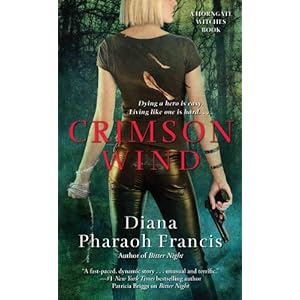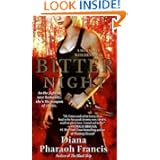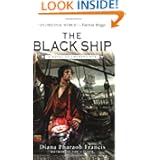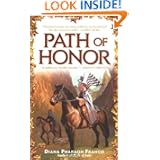
It’s a gloomy rainy day, or maybe there is two feet of snow on the ground. A quick look out the window makes the decision to be somewhere else, to dream of somewhere else - easy. A few steps to the bookshelf and your eyes begin to race across titles of books. In the back of your mind is the kind of day it is outside and how far you want to travel to make it go away for the day… There!
If it’s fantasy adventure you’re looking for, you reach for a Diana Pharaoh Francis. The book is well worn, from read after re-read, because those times you want reality to fade away aren’t as uncommon as you’d like.
My guest today, bestselling author Diana Pharaoh Francis, actually writes dreams. Based on her Amazon numbers, we are all going long on escape. Her newest book, “Crimson Wind” is flying off the shelves like a $2 iPhone.
Now a bit about my guest from her website while I pray for snow:
 “I was raised on a cattle ranch in Northern California (outside a town called Lincoln which is now part of an enormous sprawl). I taught myself to ride a horse at the age of six, as no one had the time to teach me—they were all busy learning how to irrigate, how to cajole an angry bull into another field, how to pull a calf… Afraid of heights, and absolutely sure I was going to die, I managed to scramble up on the back of a very patient and lazy strawberry roan destrier, and plod off into the sunset.
“I was raised on a cattle ranch in Northern California (outside a town called Lincoln which is now part of an enormous sprawl). I taught myself to ride a horse at the age of six, as no one had the time to teach me—they were all busy learning how to irrigate, how to cajole an angry bull into another field, how to pull a calf… Afraid of heights, and absolutely sure I was going to die, I managed to scramble up on the back of a very patient and lazy strawberry roan destrier, and plod off into the sunset. After high school, I attended college after college, racking up a BA and MA in creative writing and a Ph.D. in literature and theory. My very patient and supportive husband traipsed across the Midwest and back to Montana for me (though my husband insists that he’s been running and hiding and I just keep finding him), where I now teach at the University of Montana-Western. We also have a son Q-ball, who in our humbly unbiased opinions, is the most wonderful son ever produced, and a daughter, Princess Caesar, who is the most wonderful daughter ever produced.
I have a fascination for the Victorians, weather, geology, horses, plants and mythology, I like spicy food, chocolate and cheesecake, and I have an odd sense of humor. (Or so I’ve been told. Often.) Incidentally, the Pharaoh is in fact my real name, and oddly enough, is of British origin.”
I’m pleased to welcome Bestselling author Diana Pharaoh Francis to The Novel Road…
 |
| Diana Pharaoh Francis |
Me: Your academic resume is beyond impressive: Masters in Creative writing, Ph.d in Literature and you now teach at The University of Montana –Western. You wrangle cattle, raise a family… Where did you find the time to write all your novels?
Diana: Well, to be honest, I don’t do cattle anymore. It’s been awhile since I lived on the ranch. Now I wrangle children. And dogs. And students. Finding time is basically a matter of carving it out of every day no matter what, and having an understanding family who let me vanish into the office for the weekend or evening and fix me food and make sure the house runs and nothing floods or blows up. I don’t do that all that often, but near deadline time . . .
In the end, I have to manage my time and write whenever I have a chance. I don’t have a lot of hobbies because of that, and I definitely don’t get to read as often as I’d like. Over the years, I’ve made an effort to prioritize family time so that I don’t become ghost mom. It also keeps me sane and healthy. Relatively sane, anyhow.
Me: You have a love of history in literature. History appears low on the priority list of today’s youth. What can we do to change this?
Diana: History tends to be dry when it comes to classes. It becomes real when kids visit real sites and see where history happened. I know my son is excited about reading fiction set in important historical situations. I think fiction has the ability to get kids interested in all kinds of things, and it helps them get interested in reading non-fiction.
For me, I know that reading Dickens and Austen and Thackeray and Browning really helped make the Regency/Victorian periods more real. It shows the texture and reality of people in their cultures.
But in the end, any way you can, expose kids to history. I especially like living history museums and interactive displays of any kind.
Diana: It’s been crucial for me. Everything I write comes out of my experiences, though some of those are imaginary—experiences I’ve had reading or watching a documentary. But so much of what I’ve done has given flavor to my work, or given me plots and other details. For example, in Path of Fate, Reisil gets saddle sores when she first learns to ride and spends a lot of time on the horse. When I was a kid, I went on a long ride in shorts. I was using a saddle, which I never did—I’d grown up riding bareback and hated saddles. It wasn’t long before I developed a nasty sore inside my knee where the skin rubbed off on the leather. I was far from home and had nothing to cover it with, so it got a lot worse. That became fodder for Reisil.
On the other hand, in The Black Ship, my characters sail on a square rigged clipper ship. It’s the setting for pretty much the entire book. I’d never been sailing at all. So I went to Seattle and went sailing on The Lady Washington to see how the sails were actually raised and lowered and what it was like to be on a ship. Then I did a lot of research. But I needed that first hand experience to get it right.
There’s a scene in Crimson Wind where someone shoots a gun and the recoil sends it over their head. I had that experience shooting a .454 Cassul. It’s a cannon of a handgun. A friend let me shoot it and the recoil really does send it over your head.
Graham Greene said that every writer has to have a splinter of ice in his or her heart. What he meant was that writers, even in the middle of a horrific accident or a dreadful loss or something, keeps one analytical eye open to watch and record. Writers keep track of experiences and put them away to use in their books.
There are so many textures, smells, sounds, events and different scraps of life that make it into my books. Without them, I think the books would be plastic and boring.
Diana: Well, for one, my books get electronically pirated a lot. That’s really stomach-churning to watch as people post my books for free on download sites. These people like my books, but aren’t willing to pay me for them. And it is me. Because I only earn on what’s legitimately sold. So when I see pirating, it makes me want to weep because selling books is what makes publishers want to publish an author again and so I’m always worried that my sales numbers will sink and I won’t get to publish my books.
Other than that, the economy and the changes in publishing are still causing issues and I’m still waiting to see what will happen. Unfortunately, Borders may go bankrupt or close, and it’s never good to see stores go away. Ebooks are becoming more and more popular and it isn’t yet clear how they will be priced or how authors will get paid. There are a lot of different models for that. The major issue for me as a writer is that people continue to buy books so that publishers will continue to sign me on to write them.
Me: Lunch with you and any author you choose, from throughout history or today, and why.
 |
| Aphra Behn |
Diana: Just one? That’s too hard! If I get right down to it, though, I’m torn. One would be Aphra Behn, who was an English playwright in the late 1600s. She was also a spy. She was one of the first women to make her living writing. She was witty and smart and her plays are fun. One of my favorite passages is from her preface to The Dutch Lover. She wrote it after the play received criticism and she is scathing. Oh it’s a lovely piece of writing.
Here’s a little bit of it:
"Indeed that day ’twas Acted first, there comes me into the Pit, a long, lither, phlegmatick, white, ill-favour’d, wretched Fop, an Officer in Masquerade newly transported with a Scarf & Feather out of France, a sorry Animal that has nought else to shield it from the uttermost contempt of all mankind, but that respect which we afford to Rats and Toads, which though we do not well allow to live, yet when considered as a part of God’s Creation, we make honourable mention of them. A thing, Reader—but no more of such a Smelt: This thing, I tell ye, opening that which serves it for a mouth, out issued such a noise as this to those that sate about it, that 224 they were to expect a woful Play, God damn him, for it was a woman’s. Now how this came about I am not sure, but I suppose he brought it piping hot from some who had with him the reputation of a villanous Wit: for Creatures of his size of sense talk without all imagination, such scraps as they pick up from other folks."
Isn’t she wonderful? I would love to have written this.
My other choice would be Charles Dickens, and you know? Largely for the same reasons. He was also scathing and witty and with such a good sense of human nature and the world. I adore him and would love to have a few beers with him and listen to him tell stories.
 Me: Has the immense amount of information available now, caused a lack of learning from the past, in favor of taking current definition as a less thought out reality?
Me: Has the immense amount of information available now, caused a lack of learning from the past, in favor of taking current definition as a less thought out reality? Diana: I have no idea. I think that there is a deluge of information available now and it’s harder to be broadly read and educated, but I think that people can still think and reason and examine situations and make good decisions. I think they can still come to a good understanding of the world. I do think that politicians and corporations would prefer that people didn’t think—it’s much easier to herd sheep than thinking, reasoning people.
Me: You wake up one day and decide to write a Historical non-Fiction book. Give me the subject and overview of this dream book.
Diana: Oh that’s easy. I’d write about Emily Eden in India. She was the sister of the Governor General of India (pretty much the king of India for all intents and purposes) in the 1830s and 40s. During that time, a lot of things happened, including Queen Victoria taking the English throne. In India, Eden was a sharp and critical observer and at one point, she and her brother and sister and a huge number of people went “up the country.” A two year journey through India. I’d want to write about her and the politics of the period. It’s fascinating. She was also a novelist, and upon returning to England, she published The Semi-attached Couple and The Semi-detached House, both in a similar vein to Jane Austen.
Diana: When the book is good. The trouble is, how do you know if it’s good? Part of me thinks that it’s volume that tells you. The more words you read and produce, the more skills you have and a better barometer for understanding what makes a good story. Applying that to yourself can be painful, but oh so necessary. Feedback from a quality source is also good. Someone to tell you when things are or aren’t working.
But there’s a point where you have to stop and submit and start the next process. You move on because every project teaches you more and you become a better writer.
Me: Social Media. Talk about its importance to the modern author’s success.
Diana: I think that social media is only worthwhile if you like to do it because you like to do it. I think it’s obvious when someone hates twittering or facebooking or what have you. It’s not that fun to read when that happens and so doesn’t do anything for you as an author. I like to twitter and I like to keep a blog. I don’t know how interesting they are, but I do like them. It’s nice to have the chance in the various networking situations to talk to fans and fellow writers. Being a writer, especially in Montana, can be an isolating thing. So social networking can help keep me sane.
 Or it can suck up all my time. So I have to be careful. But I do enjoy the interaction so much. How much impact it’s had on my success, I don’t know. But I don’t do it for that, so any positive effect is gravy.
Or it can suck up all my time. So I have to be careful. But I do enjoy the interaction so much. How much impact it’s had on my success, I don’t know. But I don’t do it for that, so any positive effect is gravy.Me: Tell us about your agent and why you two are the perfect match.
Diana: My agent is Lucienne Diver of the Knight Agency. She’s fabulous. She knows the business and she’s got the energy of a hundred Energizer Bunnies. Or a dozen cats on crack. She gets my humor (morbid and twisted) and shares it. She is a writer as well, so she understand what her clients are going through. She likes what I write and totally knows how to talk me off the ledge when I’m flipping out over something. She gives me feedback on my writing when I want it and she can be a bulldog when she needs to be.
******************************************
I’d like to thank Diana for her time, for her talent, and for a reason to throw another log on the fire, close the blinds and fade into another of her fantastic stories.



No comments:
Post a Comment